Tuning in to Philippine gig culture
Picture this: you find out your favorite band will perform at a place you’ve never been to before. You know all their songs by heart; maybe a track or two was on your Spotify Wrapped last year. You’ve never seen them live, so you decide to take a leap of faith and order tickets online.
The names of the streets and its surroundings may change. Maybe it’s an unassuming old house along Guijo in Makati, a restaurant with fairy lights somewhere in Maginhawa, the basement of a Kowloon House in Matalino Street, a strip mall in Mandaluyong, a coffee shop in Davao, or a co-working space in Cebu.
Either way, you’re standing outside the venue. You show your ticket, get your wrist stamped, and get greeted with, “Enjoy the show.”
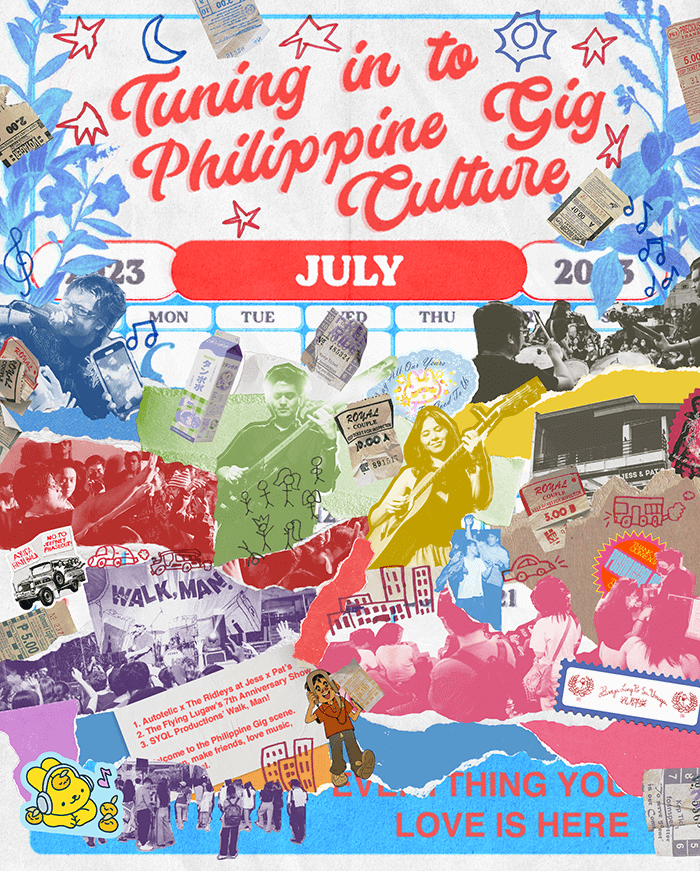
You’re met with a crowd of people. Maybe you know someone there or you don’t. But when the band takes center stage, everything else fades away. There’s only you, the band, and the music you know and love so well.
Welcome to the Filipino gig scene: a diverse community of people who love music, creating events for other people who love music.
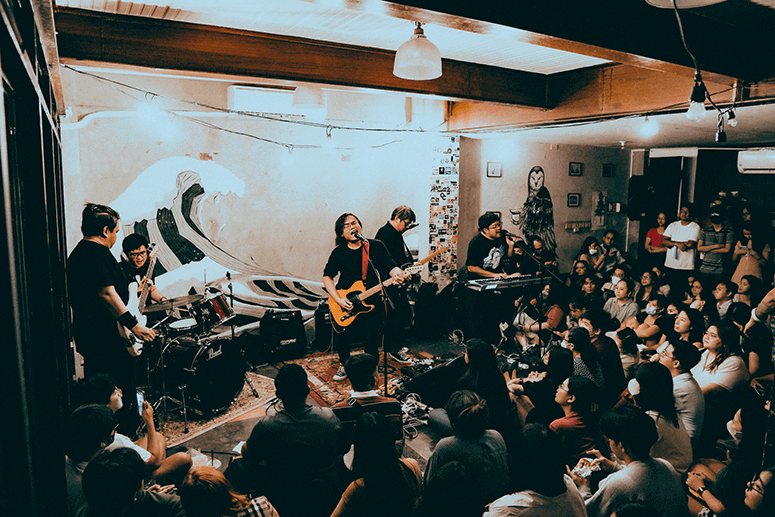

Pressing play
A gig is generally defined as a live music event that happens for one night only. In contrast to large-scale music events such as concerts, which are often held in bigger venues like arenas, a gig is associated with smaller crowds and independent, emerging artists.
It’s difficult to fully encapsulate what the “gig scene” looks or sounds like because, just like music’s complex collection of genres and subgenres, no single sound or community encompasses it. Whether you’re into punk, indie rock, electronic, or hip-hop, there are event production houses staging gigs for you—many of which, if not all, are completely independent.
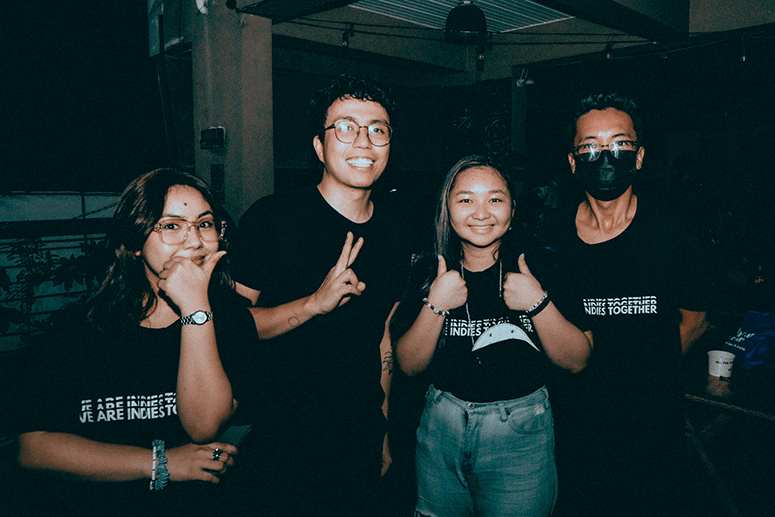
Gigs have been around in the Philippines for a very long time. It’s difficult to track down when it started, but in the early 2010s, independent prods such as Green Apple, Docdef Productions, and Red Ninja Productions were already curating shows with local indie artists all over Metro Manila.
The mid-2010s continued to see the rise of new prod houses, including the music curator-events production-music publication The Rest Is Noise. Established in 2015, it’s the brainchild of MC Galang and Ian Urrutia, who continue to organize gigs together.

MC recounts the first gig they ever staged for The Rest Is Noise: “It was supposed to be a one-time thing. We were surprised by the turnout. Sabi ni Ian, ‘Let's do it again.’” The rest, as they say, is history.
Jess & Pat’s is another iconic gig institution that emerged in the mid-2010s. But Kloyd and Alexx Majam, who opened the cafe as part of their senior’s thesis at San Beda University, didn’t actually intend for it to be a gig venue.

Being avid OPM fans themselves, the couple only organized a gig to celebrate Jess & Pat’s grand opening. They asked for help from Docdef Productions and staged their first gig with soul-fusion band Farewell Fair Weather and singer-songwriter Earl Generao. Just like MC and Ian from The Rest Is Noise, they were overwhelmed at the crowds showing up. They realized this was something they wanted to keep doing: “It was love at first sight.”
Transitioning from audience members to production team was challenging. The Majams admit they initially didn’t have any knowledge of production and the indie music scene. “We were thankful for the people who helped us out. It’s both overwhelming and fulfilling.”
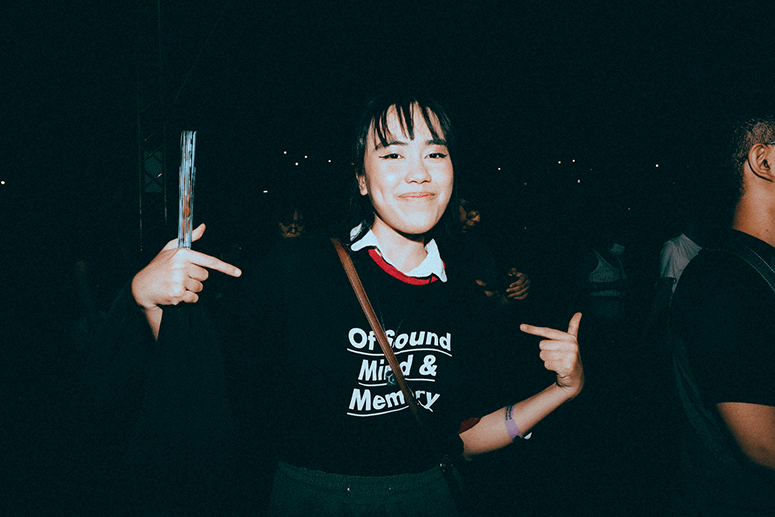
MC observes this same sense of community among indie production houses. Regardless of whether they personally enjoy the artist lineup, she says it’s comforting to know that people from different productions still come out and show support.
The same can be said for the fans. “People form their own pockets of community” at gigs, explains Elijah Pareño from local music review blog The Flying Lugaw. He’s been organizing gigs since 2017 and continues to collaborate with other productions like Furiosa Sound. “They foster their own communities, healthily. People go to shows because they want to explore their scenes.”
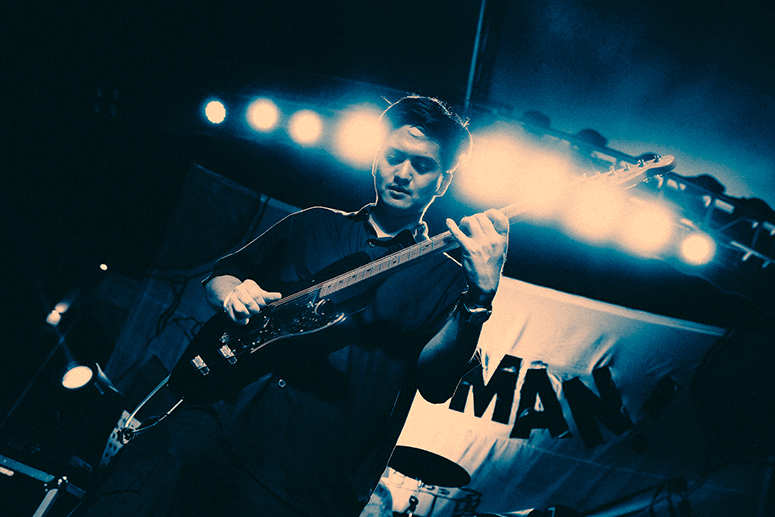

Fast-forward to the 2020s, and this sentiment still rings true among a new generation of prod houses and audiences.
Bigger than the sound
“As performers, we wanted to give something new to Davao, to introduce the gig vibe to more people, especially the new generation, because (during the pandemic), they didn’t have that,” shares Siobhan Morris, a core team member of We Out Here, a creative collective based in Davao City.

Siobhan is joined by Life Secuya, Ross Fuego, Ken Catex, and Cedric Van, all Davao-based creatives in different music, art and culture scenes in the city. Cedric brought them together in 2020 and launched their first gig in 2022 at OLO Coffee, which quickly became the collective’s headquarters.

“We wanted We Out Here to be a safe space for everyone,” the team continues. “It felt like a community with a mix of people from the creative scene and small businesses. For us, this isn’t just a collective, it’s a movement.”
This emphasis on safe spaces and building communities spans different gig scenes across the country. In Cebu City, Gee Tolsa, founder of hip-hop production house Rverb Cebu, says the city is very community-driven.
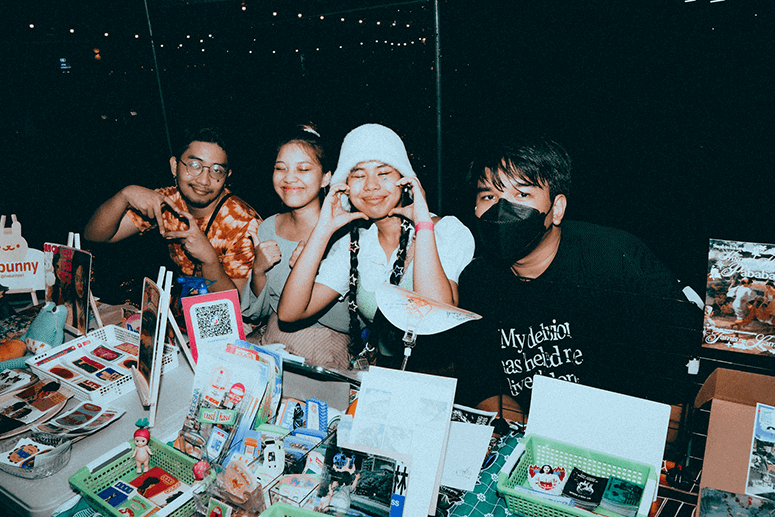
“We’re bridging the gaps through collaboration,” Gee says. “You know how, when you’re in a group that’s doing their own thing, you want to do your own thing as well? In Cebu, everyone has their own thing and then they converge—there’s this energy in the creativity that people bounce off of each other.”
Community-building became all the more important because of the pandemic. “Nawala yung gigs during the pandemic, and we had to go online. But when things went back to ‘normal,’ nawala yung momentum from the pre-pandemic gig scene,” says Sofia Abrogar, who established Metro Manila-based SYQL Productions with Any Name’s Okay bandmate Renzo Lumanog and band manager Ninna Layug. For the past five years, they’ve been self-producing their own launches and gigs as a band, and the idea for SYQL started brewing in May 2022.

“It wasn’t just the gigs—the (productions) that used to mount shows for us, the venues, a lot of them disappeared,” Renzo adds.
The live music scene was one of the hardest-hit industries during the pandemic. In June 2020, the Quezon City art space Catch272 unfortunately burned down and was unable to recover. August 2020 saw the closure of Route 196, one of the most iconic gig venues in Metro Manila. Prod houses tried to survive with online gigs streamed online or were forced into hiatus altogether. Musicians and their crew members immediately lost their source of income, and groups like Indie Manila and Red Ninja Production organized fundraisers for them.
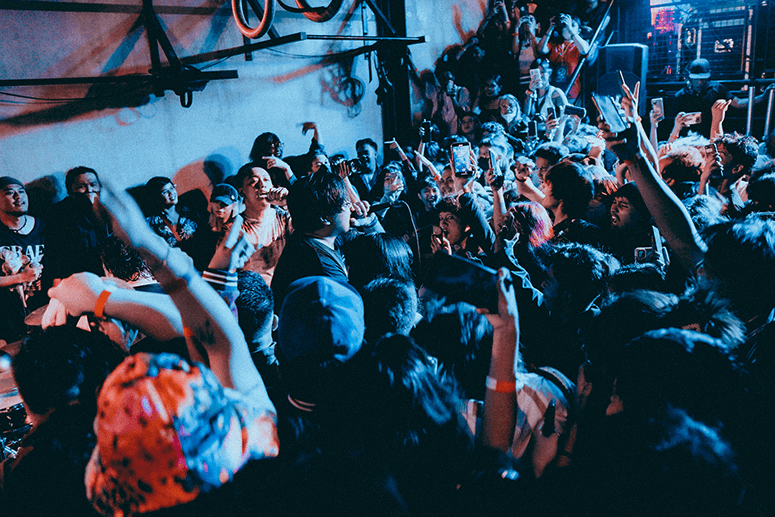
SYQL held its first gig in January 2023, featuring a diverse lineup from different genres, as well as artist stalls and food and drink booths. At the forefront of how and why they organize gigs, shares Ninna, is community-building. “You realize how supportive the community is, so we try to make our gigs as accessible as possible.”
This is emphasized by the fact that gig audiences are now relatively younger. It was because of young people in Cebu’s creative scene that Gee was able to start organizing gigs, and it’s young people who don’t just attend the shows but perform in them. We Out Here creates a community for music fans in a scene that may be intimidating for younger audiences. Even the Majams of Jess & Pat’s — who already catered to a young audience pre-pandemic—observes that their audience has gotten even younger, and also includes more first-time gig goers.
“It’s fueled by the internet,” says The Flying Lugaw’s Elijah. “Memes, chartposting”—where you post a chart of your top Spotify artists or albums within a certain period—“the overall urge to meet new friends, or to discover new bands.”
A number of reasons can explain this surge of new and young audiences, but one thing event producers point to is the power of gigs to prompt self-discovery.
The rest is noise
On one level, music is personal. We create personal connections to a song, its lyrics or lack thereof, and to the artists themselves. But in gigs, music transcends the individual—you become part of a community. Bands interact with fans and vice versa, and you can strike up conversations with people who enjoy the same music. “Your sense of community starts to develop, and in the same way, your sense of self starts to develop, too,” Elijah says.
“People find themselves at gigs because it’s outside regular life,” the members of SYQL continue. “What triggers identity formation is that we give them a unique experience where they can do something different. We provide a space for people to test things out for themselves.”
Even if you go to a gig alone, you’re leaving the monotony of the “real world” at the door. For a few hours, you get to immerse yourself in an experience of sounds and sights unlike any other. You can express yourself not just through performing, but also as an audience member. Some cry and allow themselves to be vulnerable; some shout the lyrics and cheer along. Others crowd surf and mosh. The community doesn’t judge. No matter who you are, you belong.
It is through losing yourself in the music that you find a sense of home—at home in your own skin, and home with the people around you, even if you personally don’t know them.
“You just have to find the right people, the right event, the right time and situation for you to find yourself,” the team at We Out Here says. It’s a never-ending feedback loop of people finding more about themselves through gigs and, in turn, gig culture as a whole being shaped by the community it forms. The lines between organizers, artists and audiences blur into one celebration of music’s power to unite people across different ages, backgrounds, and tastes. The names of people may change over the years, but one thing will always be constant: love for music.
“We wouldn’t be here without the previous organizers who solidified the gigs before,” Siobhan says as she reflects on her time in Davao’s music scene. What rings true in Davao remains the same for gig scenes all over the country. “You can’t explore gig culture in a day; there’s so much to discover. You just have to take that first step.”


